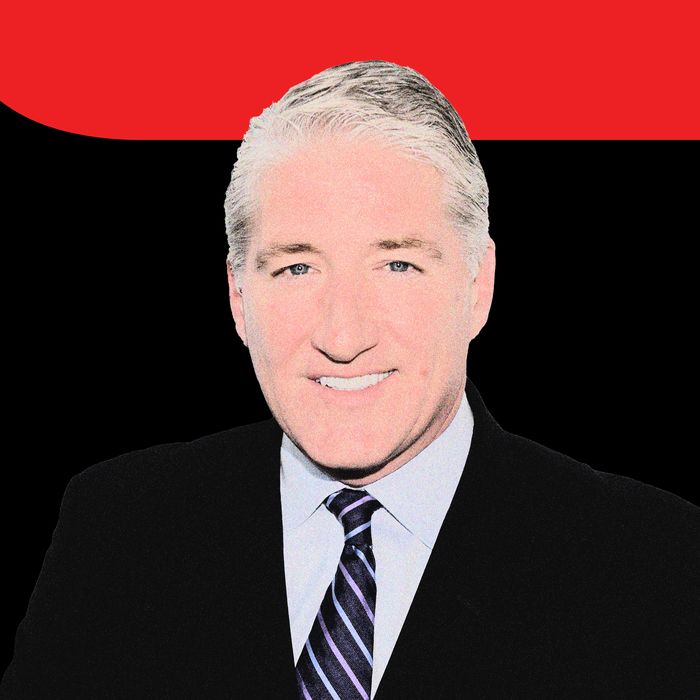
Journalist Kara Swisher is a year-round fan of John King, CNN’s Magic Wall guy, especially on election night — like the one coming tomorrow after the nation finishes voting in this year’s midterms. Swisher thinks King does an excellent job breaking down election results as they come in — walking viewers through what’s happening and what it means. So she was thrilled he could make some time to talk shop with her in the latest episode of On With Kara Swisher.
In their conversation, Swisher grills King about the state of the country’s politics, what it’s like behind the scenes at CNN on Election Night, how he prepares ahead of time, and what he and the rest of the election team at the network focus on most as the vote tallies come in. In the below excerpt, Swisher asks King about the process for making calls and he nerds out explaining the many factors taken into account as well as how he and his team try to avoid being election SportsCenter.

On With Kara Swisher
Subscribe on:
Kara Swisher: Are there things that you must have your hands on or things that you have to have at all times that are key to doing your job?
John King: Part of it is studying these districts. Who lives there? How much do they make? What’s the demographic mix? What are the prior voting patterns? What has changed since the last election? A lot of these are Sun Belt states where we’ve seen some of the dramatic changes. But also, if you think about it, New Hampshire could be very important in this election. Pennsylvania will absolutely be very important in this election. Wisconsin is critical in this election. Those are the older economy — not that they’re not transforming, but you still have all of the stresses of globalization and the stresses of trade. More white people. More older people.
And so each state … some states, there’s a lot of similarities, and that’s the challenge on Election Night. Can you find a pattern, right? Can you find a pattern that you can take across the country? Because then you can be a little bit more forward-leaning. “Even though we haven’t counted the votes here yet, this state or this district is a lot like” … “Look, let’s come back to the east as we wait to go to the west.” So that’s studying. It’s studying an experience, a combination thereof, and then always having an open mind that — Guess what? Things can change.
Kara Swisher: Things can change. So you haven’t mentioned polling yet. Does that play a role in your prep, or do you just ignore it?
John King: No, I don’t ignore it, but I always … Look, we’ve lived through the last five or six years of American life where there’s been some suspect about the polling, and there’s no doubt … there’s no doubt there’s been an issue, and those in the industry — they’re having a hard time, because technology is changing, people don’t have landlines anymore, you have to introduce the whole cell-phone dynamic. Then you have nonparticipation by some voters. Maybe some people think lying by some voters who are just resistant to “institutions” — the big media or whatever. So I look at it, but I don’t obsess about numbers.
What I tell the young people who work for the show and who I meet here in the building is “Look for trajectories,” right? Is the president going up, or is the president going down? More than any horse race, especially this close to an election, the president’s approval rating or disapproval is always the North Star in midterm elections. So look at that. Again, don’t obsess about it, but make sure you know it and understand — which way is it going? And then look at right track and wrong track. That tells you a lot about the country. Do people think it’s going in the right direction? And then a Republican pollster probably 30 years ago said, “You know what I use even though I poll every day? I look at the University of Michigan Consumer Sentiment Index, because it’s not political.” It’s just — how are you feeling right now about your life when you’re going grocery shopping and all that? So I do look at polling to study trend lines. I don’t obsess about the numbers.
Kara Swisher: So speaking of horse races, Election Night’s become a spectacle. Peak-entertainment TV. Music, graphics, the chyrons, the noises, whatever noise they make around Wolf Blitzer. I don’t understand it. Whatever, it happens. It makes you feel like it’s the Super Bowl. Is that a good thing?
John King: So this is where John King, former AP-wire guy, might give you a different answer than some people in television. My personal opinion on that would be — in moderation, right? This is not a sport. This is not a game. I may use that word sometimes, and I regret when I do. Sometimes you’re on live television, you do this, you’re talking all the time. Every day, you take this headset off and you walk away. Even on a great day, you know you could’ve said something better. I always call myself the world’s most imperfect perfectionist.
So music for pacing is great. Music to try to fake a drama — we don’t need to do that. Again, go back through the last 15, 20 years of American life. Our politics are dramatic. They are volatile. They’re also incredibly consequential, and they’re fascinating. There is change happening under our feet that we will see in this election, and then we’ll compare this election in the months and months and months after. That’s actually when I learn the most — comparing it to past elections and then trying to figure out why. Why are so many Americans disaffected? Why are so many Americans going outside of their boxes? But on Election Night — look, to a degree, it is SportsCenter. You’re picking winners and losers. You’re telling the score. And so that’s just a fact of life. It is a horse race among these candidates. But it’s not a sport, and so even I’m giving you a conflicting answer.
Kara Swisher: Yeah. So there’s a lot of pressure on that night to call a state first versus the need to get it right. Can you talk about the pressure to project or call a state and what goes into it from your perspective?
John King: We have a fantastic team working on that. On Election Night, I will be sometimes asked my advice or sometimes asked to look around. We’re thinking we’re about to call — this is fictitious, but we’re thinking we’re about to call Arizona, right? Or maybe I should pick a different state, because that one came up as an issue in the last campaign. But we’re about to call this race or this place, because we see this, this, and this. “What do you think?” And you find a rare moment on Election Night. You might see a wide shot where a panel’s talking on the side of the studio, and you see me at the Magic Wall, and I’m digging, digging — both my hands are going furiously. That’s probably what I’m doing: looking to see, I agree or I disagree. But technically, if you looked at the letterhead, I’m not on the decision team. They watch me. I can help them. We have an amazing team, and they’re very conservative.
Yes, you want to be first, but not at all costs. Not at all costs. I was, way back in my days at the AP … Walter Mears, who passed away last year, but a Pulitzer Prize winner at the AP — he covered Jack Kennedy when he was a kid, and I was 24 years old in my first campaign covering Dukakis. And Walter took me for a walk one day, and he said, “Kid, you break a lot of news. That’s really great. Just remember: You’d rather be second than wrong.” And I carry that advice with me every day of my life, and so does our team making the decisions.
Kara Swisher: So what goes into the team making the decisions besides consulting with you?
John King: Well, they have data-analytics people, they have political people, they have polling people, they have math people just to triple-check the math. It’s actually a great group of people. They’re different, but they all get along. They debate sometimes. “I think we can call this. I think we want to wait.” So what do they do? They go through past elections. They might look at some of the polling — does this track what we saw? With the caveat “Be careful about that,” but it can be a piece of it. It can’t be everything about it. How has the voter registration changed since the last election? What do we know about the campaigning in that state? We identify key counties in Pennsylvania — you know, Northampton County, Pennsylvania, that’s my swing county, right? Or Luzerne County right next to it. What about the places we know it’s already really competitive — do we have enough votes there? Do we need to reach out and talk to anybody in the states? We’re about to call the state for John King’s opponent. (I’m making up a name so I don’t pick a politician here.) Let’s call the King campaign and say, “We think you’re losing. Make your case.”
Kara Swisher: I see.
John King: Be reporters and say, “Do you have any information we don’t have? And don’t spin me, but if you can prove to me — look at precinct X. We only have 2 percent of the vote in precinct X, and we think we’re going to win that hugely.” So I’m not saying that happens every time, but you have a list of options. If it’s a close call, you triple, quadruple, and then keep checking from there. And then you make the call if you think you’re right.
Kara Swisher: Does one person like David Chalian decide this? He’s the CNN vice president and political director.
John King: David’s our political director, and in the end, they’re his decisions. But there’s a team of people, and they operate out of consensus. There’s nobody — nobody can go rogue here and make decisions. But you mentioned David. I mean, I’m blessed to work here, because we have an amazing group of people. And one of the sometimes frustrating things about television is that people know the people who are on television, but there are so many people whose names you will never know behind the scenes who are busting their asses, and they’re really great, talented, cautious, conservative people.
On With Kara Swisher is produced by Nayeema Raza, Blakeney Schick, Cristian Castro Rossel, and Rafaela Siewert with mixing by Fernando Arruda, engineering by Christopher Shurtleff, and theme music by Trackademicks. New episodes drop every Monday and Thursday. Follow the show on Apple Podcasts, Spotify, or wherever you get your podcasts.
More From 'on with kara swisher'
- Ron Klain Still Thinks Biden Got a Raw Deal
- Gretchen Whitmer on Why She’s Still Confident in Biden
- AOC on Gaza, Insults, AI, and Whether Trump Will Lock Her Up





























